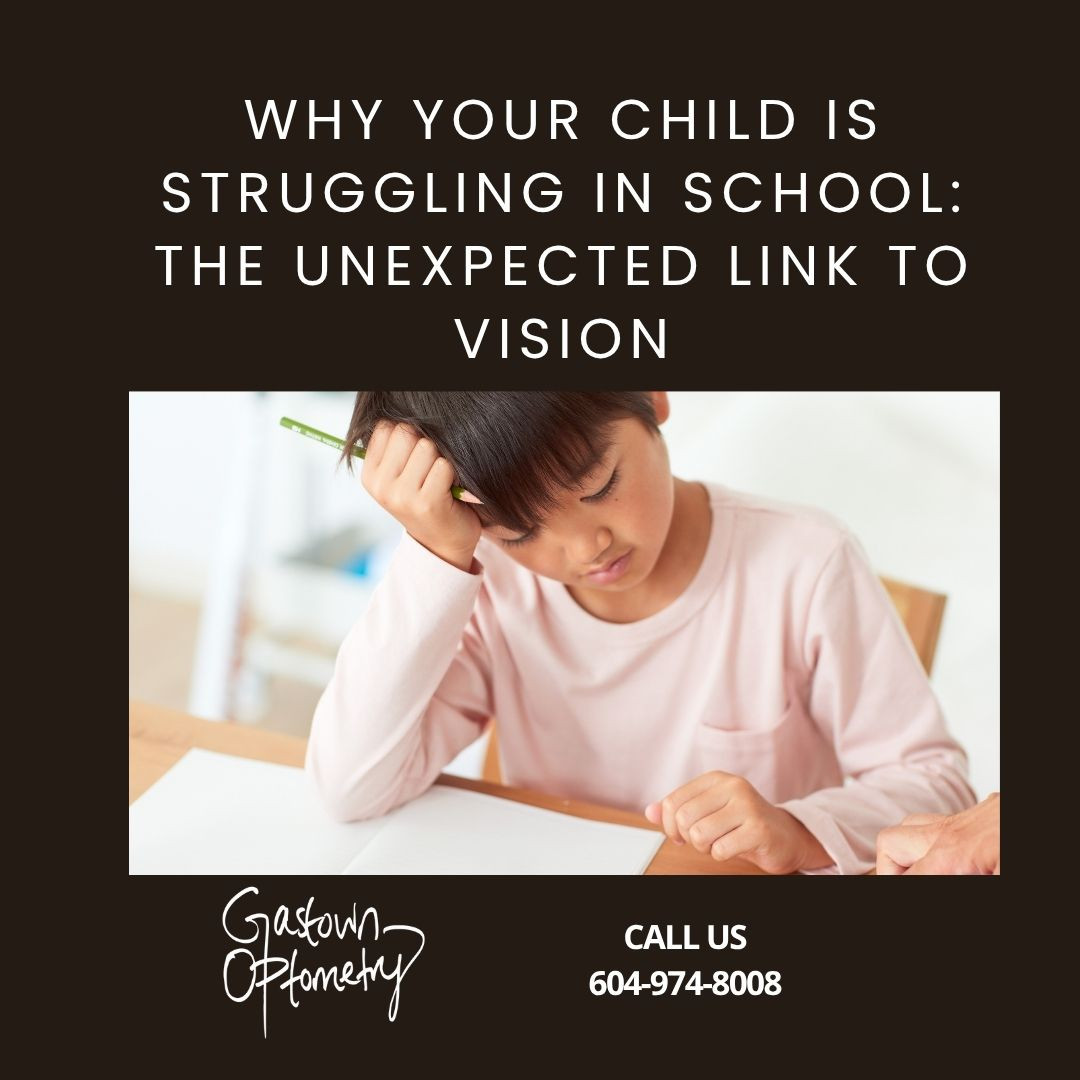More Than Just 20/20: How Hidden Vision Issues Sabotage Academic Success
Vancouver, Canada - November 28, 2025 / Gastown Optometry /
The Frustration of Unexplained Academic Struggles
It is a narrative that plays out in households across Vancouver every evening. You have a bright, articulate child who is curious about the world, yet the moment they open a textbook or sit down for homework, the walls go up. Grades slip, tutors are hired, and frustration mounts, but the improvements are minimal. Parents are often left asking: "If my child is smart, why is school so hard?"
Before you jump to conclusions about learning disabilities or attention deficits, there is a crucial question to answer: Is your child’s vision ready for the classroom?
Experts estimate that roughly 80% of learning is visual. From reading and writing to analyzing graphs and tracking a teacher’s movements, the modern classroom is a visual obstacle course. If a child’s visual system is "glitching"—struggling to focus, track, or team the eyes together—learning stops being an engaging process and becomes an exhausting battle against their own physiology. Often, the root cause of academic struggle is not a lack of intelligence, but an undiagnosed functional vision problem that a comprehensive children's eye exam can detect.
The "20/20" Myth: Why Good Sight Isn't Enough
One of the biggest hurdles to early diagnosis is the common misconception that "20/20 eyesight" equals perfect vision.
"20/20" is a measurement of visual acuity—static distance vision. It simply means your child can identify a specific letter on a chart from 20 feet away. While this is important for seeing the blackboard, it tells us almost nothing about how your child reads a book at their desk.
Learning happens within arm’s reach. It requires a complex set of near-vision skills that standard school screenings miss entirely. A school nurse’s screening is designed to catch myopia (nearsightedness). However, a child can have perfect 20/20 distance sight and still suffer from severe eye-tracking or focusing issues that make reading impossible. Relying solely on school screenings can create a false sense of security, leaving significant learning barriers undetected.

The Hidden Visual Skills Required for the Classroom
To succeed in school, a child needs more than just clear sight; they need efficient visual processing. When we evaluate a student at Gastown Optometry, we look for three critical skill sets that are essential for academic performance:
1. Eye Tracking (Oculomotor Dysfunction)
Reading requires the eyes to make precise, jump-like movements (saccades) across a line of text. If a child has poor eye tracking, their eyes may overshoot or undershoot words.
The Symptom: You might notice your child skipping lines, re-reading the same sentence, or relying heavily on their finger to keep their place. To them, the words might appear to jump or wiggle.
2. Eye Teaming (Binocularity)
The eyes are designed to work as a perfectly synchronized pair. If the muscles of the eyes are slightly misaligned or out of coordination, the brain has to exert immense effort to prevent double vision.
The Symptom: This often leads to words "swimming" on the page, or a child might physically close or cover one eye while reading to remove the confusion.
3. Focusing (Accommodation)
In a classroom, a student must constantly shift focus from a distant whiteboard to a notebook on their desk and back again. This requires the eye's focusing system to flex and relax instantly.
The Symptom: A child with focusing issues will experience blurred vision after short periods of near work. They may complain of headaches, rub their eyes frequently, or make careless errors when copying from the board because the image takes too long to clear.
Signs Your Child Needs a Professional Exam
Because children assume everyone sees the world the way they do, they rarely complain, "Mom, my eyes aren't teaming correctly." Instead, they express their visual discomfort through behavior.
Behavioral Red Flags:
The "Homework Battle": Avoidance of reading or homework, despite being willing to do other chores or activities.
Auditory Preference: They love listening to stories or have a long attention span for LEGOs, but a very short attention span for reading.
Post-School Fatigue: They come home from school exhausted or irritable, far beyond normal tiredness.
Physical Clues:
Tilting the head to one side while reading.
Holding books or tablets exceptionally close to the face.
Frequent blinking, squinting, or eye rubbing.
The Misdiagnosis Trap: It is important to note that these symptoms—distractibility, avoidance of work, and fidgeting—closely mimic the symptoms of ADHD and dyslexia. Studies suggest that a significant number of children diagnosed with attention disorders may actually have uncorrected vision problems. Ruling out vision issues is a critical first step before exploring other behavioral diagnoses.
Why You Need an Optometrist Vancouver for Diagnosis
If your child is struggling, a basic check-up is not enough. You need a comprehensive vision evaluation that goes beyond the 20/20 chart.
This is where the distinction between a vision screening and a comprehensive medical exam becomes vital. A qualified optometrist vancouver will assess the entire visual system. At Gastown Optometry, we don't just ask "can they see it?"; we ask "how much effort does it take to see it?"
Our comprehensive pediatric exams include specialized testing for depth perception, color vision, muscle balance, and focusing ability. Dr. Errin Bligh and our team use advanced diagnostic technology to pinpoint the subtle dysfunctions that interfere with learning, providing a roadmap for treatment that can include corrective lenses or specialized advice.
Unlock Your Child’s Potential with Clearer Vision
Academic struggles can damage a child’s self-esteem, leading them to believe they aren't "smart enough." Often, they just need the right visual tools to succeed. Don't wait for the next report card to signal a problem. If reading is a struggle, vision should be the first thing you suspect, not the last.
Is your child ready to reach their full potential? Eliminate the guesswork and book a comprehensive children's eye exam with the expert team at Gastown Optometry today. Let us help your child see a brighter future.

Contact Information:
Gastown Optometry
315 W Cordova St
Vancouver, BC V6B 1E5
Canada
Errin Bligh
+1 604-305-3104
https://gastownoptometry.com/

